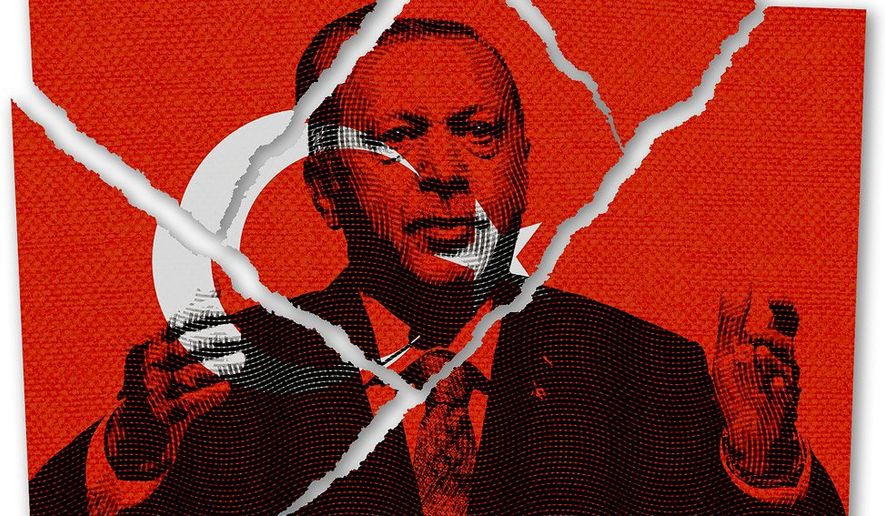OPINION:
The Middle East rightly has a reputation for inscrutability, with seemingly illogical actions part of its routine business. The Saudi crown prince kidnapped Lebanon’s visiting prime minister, forced him to resign, only to watch him return to his position on return home. The Palestinian Authority angrily refused to attend a conference in Bahrain where it could gain up to $27 billion. And then there’s the Istanbul mayoral election re-run that took place Sunday.
The original election took place in March, when President Recep Tayyip Erdogan’s candidate lost by a microscopic 0.16 percent. Discontented with this outcome, Mr. Erdogan did what a dictator naturally does and ordered it nullified on the basis of a minor technicality, with a redo to follow. One would imagine he also told his minions to get it right the second time and ensure that his candidate won by a substantial margin. Instead, his candidate lost by a whopping 9.22 percent, almost 60 times’ larger margin than his loss the first time.
This drama prompts two questions.
First, why did Mr. Erdogan allow it to happen? He has ruled as a near-absolute dictator for about six years, so it would have been consistent for him to demand a big win. He controls the military, the police, the parliament, the judiciary, the banks, the media and the educational system. He does whatever he wants. For example:
He rigs elections and, of course, undid the earlier Istanbul election. He builds palaces and airports wherever he likes at whatever cost he wishes. He orders the central bank to charge whatever interest rates please him. He ran a “controlled coup.” At will, he drills for gas in a neighbor’s exclusive economic zone or violates its air space. He colludes with ISIS. He has thugs intimidate opponents. He fires, jails or tortures anyone who crosses him in Turkey, including foreigners. He abducts Turks from distant countries. He creates and deploys his own, private army.
Given such power, why did he allow a free election in Istanbul and not tamper with the results? Dictators do not normally let their enemies win the country’s most important city, and all the less so after Mr. Erdogan called the fight for Istanbul a matter of “national survival” and predicted, “If we stumble in Istanbul we lose our footing in Turkey.”
The Istanbul election oddity fits into a larger context of what I have dubbed the “Erdogan enigma.” Time and again, the Turkish president takes illogical or self-defeating steps: He gratuitously made a powerful enemy by declaring political war in 2013 on Fethullah Gulen, his longtime Islamist comrade-in-arms. He forfeited visa-free travel for Turks to the European Union, a very important goal, preferring to stick to a meaningless legalism. He made a huge effort, paying a high political price, to win a referendum in 2017 changing the constitution that he had for years ignored. He sunk the Turkish currency in 2018 because he bizarrely believes that high interest rates lead to high inflation and concludes from this that “[high] interest rates are the mother and father of all evil.”
But the various explanations that come to mind explaining the humiliating loss — Mr. Erdogan’s will is faltering, he has a trick up his sleeve, he wants to return to democracy — all strike me as implausible.
My second question is: Why is no one but me puzzled by this development? Every analyst I read treats the functioning of democracy in Turkey as perfectly normal, ignoring the country’s being dominated by a despot. Headlines tell of a “tectonic shift,” a “stinging blow” and a “disastrous loss,” assuming that Mr. Erdogan will accept his loss. For them, the Istanbul election begins a new era for Turkey.
Not for me. I see it as an anomaly to be righted. Accordingly, I predict that Mr. Erdogan’s tyrannical impulse, inexplicably in remission, will soon re-emerge. When it does, he will take back control of Istanbul. He may again resort to a technicality, or he might this time accuse the mayor of connections to Fethullah Gulen and “terrorism.” Whatever the reason, the effect will be the same: A reassertion of the autocrat’s supreme will over the entire country.
In retrospect, the Istanbul election will be seen as an exception to Mr. Erdogan’s path toward absolute control. It will be remembered not as a tectonic shift, stinging blow or disastrous loss, but as a small interlude in the inexorable unfolding of his country’s ruination.
• Daniel Pipes (DanielPipes.org, @DanielPipes) is president of the Middle East Forum.




Please read our comment policy before commenting.